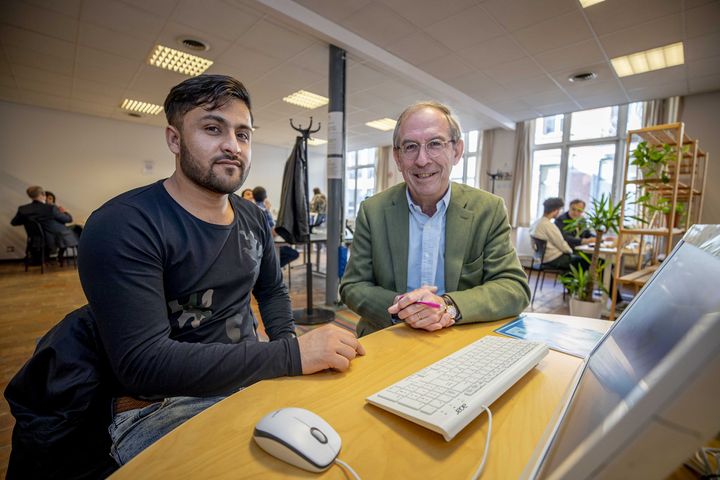 Helping Immigrants Through the Obstacle Course of Getting a Job
Helping Immigrants Through the Obstacle Course of Getting a Job(Yicai Global) June 24 -- "In Afghanistan, when you want to find a job, you go and see people directly. They give you two to three days' work and then you go and look elsewhere. Here it's completely different: you need qualifications, experience, one type of contract or another…" Speaking softly and in perfect French, Rozy-Khan Shinwari, 25, recalled his struggles to navigate an indecipherable mazeas he tried to find employment. Despite the best efforts of the Public Center for Social Welfare (CPAS) and the Brussels-Capital Region Employment Office (Actiris), Shinwari, a young refugee who arrived in Belgium at the end of 2015, found himself at a loss. There was either too much information, or too many things unsaid, or codes that he couldn't understand.
It was thanks to Afghan friends that he discovered Duo for a Job, an association that specializes in facilitating the job-hunting process via mentoring. In five years, the nonprofit has matched 1,330 young jobseekers from immigrant backgrounds with senior or retired professionals well-versed in the ways of the Belgian job market.

"Rozy had already done the groundwork," mentor Patrick Beauvois, 63, said. Still active in the insurance sector, Beauvoistook the young man under his wing for six months. "He had a decent CV but it was too formulaic. He was searching but not finding his match. So, we went back to the basics: what do you want to do, what don't you want to do?"
What Shinwari likes is sales and the food sector. Beauvois thinks this is because they remind Shinwari of his father's shop in his home country, saying, "It's important to have some landmarks in an environment where everything has to be rebuilt from scratch." The polite and hard-working Afghan had found employment for three months as a part-time storekeeper. "The owner was happy with me, but there wasn't enough work to keep me on. Since then it's been difficult. 'Sorry, I haven't got a degree but I can assure you that I'm competent!' It doesn't work like that here," the young refugee said.
In terms of experience, Shinwari isn't starting from zero. During the two years he spent in the army, his salary provided for his family, as his father was no longer capable of working. He had to flee the country after the Taliban took his older brother away in retaliation – even now, nobody knows where his brother is. "My younger brother is somewhere in Turkey, but over there, work means doing 12-hour days for a very low wage, and he's too small and weak to be doing that," he said. Hence the urgency to get a job and send money back home. "The work I had allowed me to send some money, but it's not enough."
A sense of urgency to find a job can be, paradoxically, a major hindrance to developing a long-term career. One may incur debts that need to be quickly reimbursed, or need to declare a stable situation to the authorities so that relatives can come, or fear saying no to a temp agency in case they stop calling, or simply need to be in control of one's life again and feel reaffirmed as the head of a family after months of living on state assistance as an asylum seeker. This survival state of mind is "hardly compatible with a structured orientation process that aims at long-term professional insertion," Duo for a Job observed in an "experience report"published at the end of February.

In this report, the association drew in sight from data that it collected over five years, in order to better understand the needs of marginalized people on the Belgian job market.The report describes a variety of profiles, such as underemployed, working in unstable jobs, or doing part-time work. Around half the profiles are those of refugees, and the other half are people who came to Belgium for family reunification. "It's important not to create policy aimed at 'young people from immigrant backgrounds' as if they were a homogenous group," Julie Bodson, Advocacy Manager at Duo for a Job, asserted. There are some who are skilled, even highly skilled, yet blocked because their qualifications aren't recognized, and others who are illiterate and lost in a society organized around the written word. "What they all have in common is that they benefit from personalized support," Bodson said.
Duo for a Job can now lay claim to a certain level of expertise – 73 percent of the young people who have taken part in the program have found a training course or job. The association gives credit to its mentoring system, which tackles two main issues that young people often overlook: a lack of self-confidence and no network. "When you've had doors closed in your face, you ask yourself what you've done wrong and then you give up," said Beauvois, who has mentored several young people. "That's part of the role of the mentor: looking a person in the eye, telling and showing them that they're competent, that they're valuable."
Thanks to his mentor, Shinwari has met with supermarket managers – a great way to learn about the trade and employers' expectations, even if he hasn't yet received a job offer. But now he has a plan that should pay off: he'll continue with French classes so that he can join a training course in sales. "My spoken French is okay, but I still find the grammar difficult," he said. In the meantime, the young man, who speaks Pashto, Dari and French, hopes to find work as an interpreter.
This article is being published as part of 7.7 Billion, an international and collaborative initiative gathering 15 news media outlets from around the world to focus on solutions for social, economic and civic inclusion.
